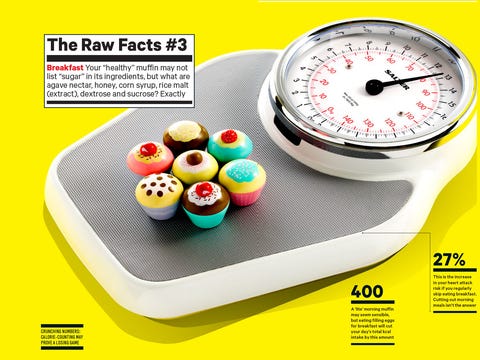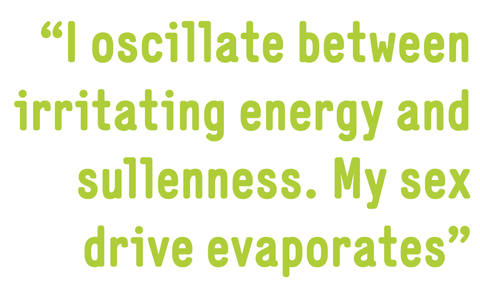Raw Food Diet 30 Day Results

In his book Salt, Sugar, Fat: How the food giants hooked us, journalist Michael Moss explains how that trio of ingredients are manipulated to produce the "bliss point": an intensely satisfying crunch of chip or bite of burger that swiftly evaporates to leave you craving another hit. If you remove one factor – say, fat – you have to either bump up the others or produce something no one wants to eat. Maybe this is why, in the demand for low-fat "healthy" goods, headlines are reporting that the salt content in supermarket ready-meals has seen a huge spike in the last few years. So even with this recent spike, can a diet of self-proclaimed healthy out-the-box meals deliver results?
The science, as we all know, is basic thermodynamics. If you don't burn the energy you ingest, it has to go somewhere: your belly, your moobs and, most insidiously, wrapped around your internal organs. But put fewer calories in, and instead your body burns the fuel you've stored. You lose weight, get healthier and rippling fat evaporates to reveal ripped abs. Cut the calories, lose the love handles – it's simple maths. Right?
Which is why the food industry is obsessed with numbers. You know, the ones you see on the front of everything it produces. The traffic-light system, the wheel of health, assorted percentage symbols preceded by single-digits – the lower the figures, the more likely we are to put them in our shopping baskets. But is there really such a thing as a 'healthy' lasagne? Can you eat comfort food every day and still burn fat?
Weight Watchers promises you can; nutritionists are sceptical. "The marketing of most foods as 'healthy' is misleading," says Marion Nestle, a nutrition and public health expert at New York University, who draws parallels between big food and big tobacco. Like low-tar cigarettes, diet foods might be less harmful than the full-fat processed version. But they're still bad news. "The key is this: weight is about calories, and where they come from doesn't matter much," she says. "Health, however, is about the quality of the calories and the healthiest foods are almost always unprocessed and natural."
It's an argument that's evidently not being heard on the street. In the UK alone, we buy more than £2bn worth of this diet food annually. Who hasn't suffered at the hands of weak will after a long day, and succumbed to a low-fat ready meal instead of getting the steamer out? I want to find out how much weight, so to speak, the promises of the diet food industry actually hold. To find out, I'm going to put my every nutritional decision in the hands of the very industry that many experts see as being responsible for a snowballing obesity crisis. For a fortnight, nothing without a low-calorie, low-fat or otherwise health-honing promise on its packaging will pass my lips. Healthy Living, Count on Us, Be Good to Yourself – these will become my new foodie friends that, if the labelling is to be believed, will allow me to eat myself into model health. The proof will be in the reduced-sugar pudding.

Low Fat Never Seemed So Sweet
Day one. The Italian aisle at Tesco. Nutritional boasts are being screamed at me. Low fat! Low calorie! Wholegrain! Fibre! It's a crib sheet in healthy eating. Tesco's fully leaded beef lasagne, for example, packs 525 calories into every serving and has a trio of crimson numbers on the front of the pack. No go. But the Weight Watchers equivalent claims only 307 calories, just a fifth of my daily energy allowance and a quarter of the other version's fat. An impressive feat considering the recipe includes cream and three types of cheese. In the basket it goes.

But it quickly becomes apparent that what's promised on the packaging doesn't necessarily align with what lies inside. When the microwave pings, I'm not sure whether to eat it or make soap from it. I seem to have accidentally bought wet Mighty White smothered in catarrh. And yet, for all its visual impact, it slinks across my tongue as though embarrassed to be there. Bar a flicker of saltiness, which dissipates as quickly as it arrives, there's nothing. The flavour is like used bathwater full of gristle. It's the epicurean equivalent of swapping a festival soundsystem for N-Dubz blasted out of a mobile phone.
A few days in and already it's clear I'm going to struggle keeping it up for a fortnight. And according to Dr Scott Harding, a lecturer in the diabetes and nutritional sciences division at King's College London, that's part of the problem. The biggest culprits when it comes to diets failing? Monotony and unpalatability. My approach features both. "Diets like this aren't sustainable. It's too much of a change," says Harding when I complain about last night's supper, an anaemic Weight Watchers chicken and lemon risotto ("Convenience never tasted so good"!), which has all the citrus kick of Toilet Duck. Looking through my food log, Harding also points out that although I've slashed my fat intake, sugar has rocketed – from 20g a day pre-diet to pushing 100g now.

What's more, fat isn't just about flavour. "Foods that contain fat slow down the release of sugar," Harding explains. My diet, on the other hand, in which fat has been swapped for simple carbohydrates, provides an energy injection that burns too fast – an immediate spike followed by a lethargic low. "You go into a metabolic period where you're actually a little bit hypoglycaemic," says Harding. This means that the insulin my body has released to deal with the excess sugar is too effective, dropping my blood sugar below normal levels.
Cue headaches, mood swings and a distinct inability to focus on anything that isn't food. In my other half's words, I become a prick. Four days in, I already oscillate between irritating energy and sullenness. My sex drive evaporates. I spend longer at the office because I don't want to have to go home and eat yet more depressing food. I'm eating "healthy" meals; I feel anything but.

A Calorie is Not a Calorie
My first – and only – visit to the gym in the first week ends in me almost falling off the treadmill after 15 minutes, too exhausted to continue. I'm not alone. Research by pharmaceutical giant GlaxoSmithKline discovered that 30% of men focus solely on calorie intake when trying to lose weight, even though they knew exercise was a more effective solution. Take out energy and, well, you take out energy.
As I reluctantly tuck into a Morrisons Cumberland Pie after my aborted workout, I contemplate why, even though we all know that losing weight is as simple as cutting calories, we're all getting fatter. To find out I get in touch with Gary Taubes, author of The Diet Delusion . According to Taubes, modern dietary advice is failing because it's trying to answer the wrong question.
"The notion that obesity is caused by changes in energy balance – taking in more calories than we expend – is naive," he says. Taubes believes that reducing nutrition to mathematics is, at best, misguided. As he puts it: "It's like saying Bill Gates got wealthy because he took in more money than he spent." A factually true analysis, although you'd fire your financial planner if that was the advice he gave you. But this is what we're told: eat less, lose weight. "If someone's getting fat, they have to be taking in more calories than they expend. The question is 'why?'" And that's a rather tougher ask.

For years, our food has been sold to us broken down into individual elements. Not, of course, its ingredients (quite the opposite) but rather the macronutrients that constitute the frozen beef and potato hotpot in your basket, detailed in those traffic lights on the front and the handy grid on the back. But this oversimplification of the things we eat is doing us a disservice. To extend our economic allegory, it treats all the money going into your account as equal. Your paycheque looks the same as cash you won on a scratchcard or stole from a bank. But if you were to ask the Inland Revenue about that income, or the police, they might have a different idea about how it should be dealt with.
In a straight macronutrient shootout, the red saturated-fat box on a sirloin steak means it's less healthy than a reduced-fat lasagne and chocolate mousse combo. But from my postprandial sugar crashes, I'm not convinced my body agrees. Nor does Dr Aseem Malhotra. "A calorie is not a calorie," he says. "It's ridiculous that people think they're all the same." A consultant cardiologist and the science director of pressure group Action on Sugar, he's long railed against the food industry's low-fat health promises.
"I explicitly tell my patients, friends and family to avoid anything marketed as low fat, heart healthy or cholesterol lowering," he says. As he lists study after study proving that calorie-controlled diets not only don't work, but pose severe health risks, his voice rises. "It horrifies me how the industry manipulates people into buying food to be healthy, but it has no proven health benefits." This is not encouraging information for someone who has spent seven days transferring this "good for you" grub from microwave to mouth.
But if these healthy lines still stacked in my fridge aren't good for me, why does the supermarkets' marketing so explicitly suggest otherwise? "The whole diet phenomenon has been music to the ears of the food industry. Because it's meant higher sales," says writer and campaigner Michael Moss. Brands such as Coca-Cola see low-calorie options as that holy grail of supermarket shelf domination – the line extension. "They have a minimum of 'cannibalisation' – a detrimental effect on the sales of their main line. To the contrary, they generate buzz and interest in the whole brand and expand sales by attracting people in." And, as Moss points out, often it's not the people most in need of low-cal options who pull them off the shelf. Rather, it's the person who feels a diet drink excuses the pizza they also put in their basket.

Calorie Counting Is Killing Us

After my weekly weigh-in, the scales show up a kilogram of progress that the mirror does not. Meanwhile, I'm suffering a headache induced by the sugar in my '1 of your 5-a-day, 0% fat' smoothies.
Since fat is twice as calorie dense as carbs, by ditching it, the all-important number in the kcal box drops. And since "weight = energy in - energy out", that figure decides whether or not a diet food sells. But it turns out that we may have unfairly maligned fat as the nutritional bogeyman. Research published by The New England Journal of Medicine found that four daily tablespoons of olive oil, as part of a Mediterranean diet, slashed heart attack and stroke risk by 30%. In fact, the results were so marked that the study had to be stopped early because it was deemed unethical to continue putting the comparative group, placed on a low-fat diet, at risk.
"That quantity of olive oil contains about 500 calories," says Dr Aseem Malhotra. "This a food that has clear benefits: it will reduce your risk of heart disease, stroke, cancer and dementia. Compare that to a can of Coke. It contains just 139 calories, but we know which one is linked to type-2 diabetes." This is where low-fat, calorie-counting diets collapse: 500 calories of sugary soft drink do not have the same impact on your body as 500 calories of olive oil. The numbers on the front of the pack are irrelevant, because what's inside could kill you anyway.

Crashing Out of Crash Diets
Even so, come the final weigh-in, it seems my miserable fortnight has worked. I've dropped nigh-on two kilos and shed almost 2% of my body fat. On many levels this is a sonorous endorsement: an easy-to-follow, fat-burning diet that hasn't bankrupted me, adheres to the nutritional guidelines handed down by government and the World Health Organisation, and seems to eat away fat without compromising muscle. But despite this, the only nutritionist I can find to recommend my diet is one whose paycheques are signed by Marks & Spencer.

For a final analysis of my Diet Diet, I run my results past medical director Dr Eric Asher. He is unimpressed: "These things assist people who are cretins to become less cretinous." By which he means that if you exist on nothing but fast food then diet food at least offers a slight improvement. "But it's only a whisker better. I would bypass it entirely. It's a diversion rather than a stepping stone." His recommendation, as with everyone else I speak to, is neither sexy nor swift: cook, don't eat processed foods and realise that losing weight and actually keeping it off takes time.
Most importantly, ignore the labels. "Stop counting calories and focus on good nutrition," says Malhotra. Your body's very good at getting itself in energy balance and so long as you avoid processed foods designed to bypass its feelings of fullness, it will do its best to stop you from overeating. "When you've got labels on food, most of the time that means it's processed," he continues. "Can you find a label on an apple that tells you its nutritional content? No. But those are the foods you want to be eating. An industry has developed around labelling food and marketing it as being healthy when it is the complete opposite. We need to move away from that."

When I ditch the packaged swill, with my abs still stubbornly swaddled, I return to my former eating habits. Only now they have been amplified. Within the first few days I nip out for a second burrito lunch an hour after the first, a slip that would have seen off my entire daily calorie limit a week ago. On my first weekend off, Basiliano Pizza's deliveryman visits four times, his stare growing increasingly concerned with each return. This is a problem I share with two thirds of dieters, according to a study from UCLA, which found that five years after a diet, you'll be looking at a bigger number on the scales than you started with. As I was warned before I began my crash course in crash dieting, it was never going to be a sustainable dietary plan. That I'd return to my gluttonous vices was inevitable. And this yo-yoing, says Malhotra, is associated with heart attacks and strokes independently of weight. Bad news.
I shouldn't be surprised that health problems brought on by weak willpower can't be fixed by relieving myself of the onus entirely. And it makes sense that the very food manufacturers responsible for the obesity epidemic in the first place wouldn't be the people to entrust with my health, or yours. For all their posturing, the companies behind these products don't care if you lose weight – they care that you buy their food. As former Weight Watchers finance director Richard Samber admitted in an interview in 2013, the 84% of people who fail and keep coming back are "where your business comes from". To become a weightloss success, not a statistic, personal responsibility is the prescription. From now on, if it's got a label, it doesn't go in the basket. If it promises a quick fix, I'm steering clear. And if it offers all the flavour with none of the fat, I now know that's a pledge no meal can possibly keep.
Source: https://www.menshealth.com/uk/mhsquad/weightloss-membership/a750656/can-a-diet-food-diet-deliver-real-results/
0 Response to "Raw Food Diet 30 Day Results"
Post a Comment